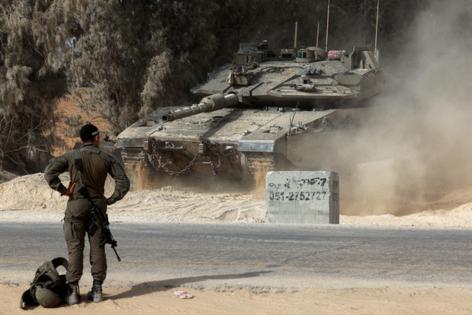Israel pushes to gain ground in Gaza as Hamas weighs ceasefire
Published in News & Features
Israel is intensifying military operations in one of the last Hamas strongholds in Gaza, as the sides stake out positions before ceasefire negotiations proposed by U.S. President Donald Trump.
The escalation comes as Hamas weighs a call by Trump to enter a 60—day ceasefire during which it would return half of the 50 hostages it still holds and pursue mediated talks with Israel to end the war. The proposal, accepted by Israeli Prime Minister Benjamin Netanyahu, will be one of the major topics during his visit to Washington next week.
The Israeli army has ordered tens of thousands of people to leave the outskirts of Gaza City since Tuesday and stepped up air strikes and incursions in the northern city, leading to an increase in the number of fatalities. Gaza City was home to around 1 million Palestinians before the war began.
Israel’s television station N12 said some 50,000 soldiers were deployed throughout the territory.
“As we have warned, the dismantling of Hamas will continue and progress to all parts of Gaza City as needed,” said Israel Defense Forces spokesperson Avichay Adraee.
A ceasefire would pause a war that’s raged since October 2023, when Hamas poured into southern Israel, killed 1,200 people and abducted about 250 others. About 50 hostages are still in Gaza, with some 20 thought by Israel to be alive. More than 57,000 Palestinians have been killed in the ensuing military campaign, according to the Hamas-run health ministry in Gaza. Large areas of the enclave have been reduced to rubble.
Under the proposed ceasefire, Hamas would return 10 living and 18 deceased hostages in five phases, according to an Israeli official briefed on the discussions, who asked not to be identified by name.
One core issue stands in the way of an agreement. Israel wants Hamas toppled and disarmed before calling off the Gaza offensive. Hamas has signaled it might cede some power but not its weapons — and wants guarantees that a truce would lead to a permanent end to the war, with Israel withdrawing from the Gaza Strip.
Fatalities spike
More than 300 Palestinians were killed since Monday, according to the Hamas-run health ministry, which doesn’t differentiate between civilians and combatants. At least 74 died in strikes on Monday, including 30 at a seaside cafe, Hamas said. In the past 24 hours 118 people died, the health ministry added.
Though battered by the war, Hamas has kept up its attacks. On Tuesday, ambushes in an eastern district of Gaza City killed one soldier and wounded eight others, the IDF said, bringing fatalities within the territory to 438 since ground operations began.
The Gaza City operation aims to pressure Hamas and gain ground before any negotiations, retired Israeli army General Amos Gilead said.
“If by being intensified it improves the prospects for a release of hostages under a U.S.-sponsored deal, all the better,” the strategy lecturer at Reichman University added.
Israel’s 12-day war with Iran last month dented the regional sponsor behind Hamas — which is designated as a terrorist group by the U.S. and many other countries. Moreover, most Israelis now favor a deal to free all hostages even if Hamas is left standing, recent opinion polls show.
Even so, Netanyahu has publicly stuck to his government’s war goals, saying in a speech on Tuesday: “Hamas won’t exist anymore. ‘Hamastan’ won’t exist anymore.”
-------------
—With assistance from Ethan Bronner, Fares Akram and Fadwa Hodali.
©2025 Bloomberg L.P. Visit bloomberg.com. Distributed by Tribune Content Agency, LLC.







Comments